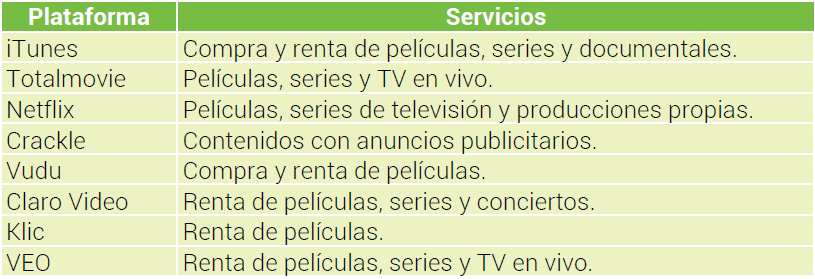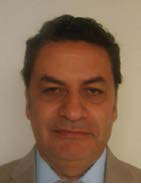Los Servicios OTT: provisión de contenidos vs televisión abierta y de paga
 Los servicios Over the Top (OTT) pueden definirse como aquellos servicios de video, audio, voz o datos que se transmiten sobre las plataformas de internet fijo o móvil y que generalmente no son provistos por los operadores tradicionales de telecomunicaciones. Este tipo de servicios incluye la distribución de audio y video asociado (como YouTube), videoconferencias (como Skype o Facetime), contenidos audiovisuales bajo demanda (Netflix, Claro TV, etc.), servicios de mensajería (WhatsApp, Line, etc.) y comunicación a través de redes sociales (como Facebook, Twitter, LinkedIn, Waze).
Los servicios Over the Top (OTT) pueden definirse como aquellos servicios de video, audio, voz o datos que se transmiten sobre las plataformas de internet fijo o móvil y que generalmente no son provistos por los operadores tradicionales de telecomunicaciones. Este tipo de servicios incluye la distribución de audio y video asociado (como YouTube), videoconferencias (como Skype o Facetime), contenidos audiovisuales bajo demanda (Netflix, Claro TV, etc.), servicios de mensajería (WhatsApp, Line, etc.) y comunicación a través de redes sociales (como Facebook, Twitter, LinkedIn, Waze).
Estos servicios requieren un dispositivo terminal con acceso a internet, tales como la computadora, el teléfono inteligente, la consola de juegos, la tableta o el televisor inteligente. A diferencia de los servicios tradicionales, el proveedor de servicios OTT generalmente es distinto del operador que administra la red. Los atributos de las ofertas del servicio dependen exclusivamente del proveedor de OTT, pero la percepción de calidad recibida por el usuario se ve influida también por la calidad y capacidad del acceso a internet de la red que provee la infraestructura.

El incremento en los servicios OTT se ha dado en forma acelerada. WhatsApp, una app de servicios de mensajería, posee actualmente 500 millones de usuarios activos en el mundo1.
México es uno de los cinco países donde mayor crecimiento ha experimentado esta aplicación, y aproximadamente 88% (32 millones) de usuarios de teléfonos inteligentes en el país la utilizan. Skype, por su parte, cuenta con cerca de 520 millones de cuentas; y México es el receptor neto de llamadas más grande del mundo para este servicio de videoconferencias.
Respecto a las redes sociales, Facebook tiene alrededor de 1,250 millones de usuarios en el mundo. En México aproximadamente 51 millones de usuarios se conectan de forma mensual, de los cuales 31 millones lo hacen diariamente y 25 millones por vía móvil.
Twitter cuenta con más de 241 millones de usuarios en el mundo, de los cuales cerca de 11.7 millones se encuentran en la República Mexicana, destacando que 76% de los usuarios activos tienen acceso al servicio desde un teléfono móvil2.
PROVEEDORES DE SERVICIOS OTT EN MÉXICO

Datos recientes3 señalan que las redes sociales con mayor grado de adopción en México son Facebook, Twitter, Youtube e Instagram. El 95% de los internautas se encuentra suscrito a Facebook; en segundo lugar se ubica Twitter, con un coeficiente de penetración de 34% entre los usuarios en México.
Uno de los servicios OTT que más popularidad ha logrado es el de provisión de contenidos bajo demanda. Esta nueva atracción audiovisual involucra a los proveedores del servicio de internet en materia de infraestructura y capacidad, por la calidad de conexión que se demanda, y a los proveedores de contenidos OTT, por los altos estándares en definición de video que los clientes requieren. Es decir, para poder disfrutar de los servicios OTT se requiere de un dispositivo compatible, contenidos con elevados estándares de calidad que respondan a las demandas de los usuarios y, de manera muy destacada, contar con una conexión a internet con la velocidad y capacidad suficientes para asegurar una experiencia satisfactoria para el usuario.
En cuanto al primer requerimiento, sobresale la computadora como principal medio de acceso a contenidos digitales, ya que 80% de los usuarios utiliza estos dispositivos. Sin embargo, de acuerdo con información de The CIU, el creciente acceso a otro tipo de tecnologías de conectividad ha permitido que a la fecha, los consumidores también utilicen frecuentemente otros medios, como los teléfonos inteligentes o las tabletas.
En la actualidad podemos encontrar diversas plataformas de servicios OTT que sobresalen de forma importante dentro del sector de telecomunicaciones. En México, existen ocho principales proveedores de contenidos audiovisuales con el esquema de OTT: Total Movie, de Grupo Salinas; la empresa estadounidense Netflix; Crackle, administrada por Sony; Vudú, de Walmart; ClaroVideo, perteneciente a América Móvil; iTunes Movies, de Apple; Klic, servicio de Cinépolis, y ahora también VEO plataforma de streaming de Televisa.4
De acuerdo con cifras al primer trimestre de 2014, sólo 16.3 millones de mexicanos cuentan con acceso efectivo a internet de banda ancha fija, mientras que los usuarios de banda ancha móvil se estiman en aproximadamente 16.55 millones. De este total de usuarios, un gran porcentaje tiene servicio de internet de baja capacidad, lo que limita las posibilidades de hacer descargas rápidas de contenidos audiovisuales de alta calidad. Por esta razón, sólo una pequeña parte de los suscriptores son usuarios potenciales de este tipo de servicios OTT6.
En el caso de los contenidos audiovisuales, la adopción de plataformas OTT en México se encuentra en una fase inicial, donde el crecimiento de la base de usuarios se logrará en la medida en que se alcance una mayor penetración, menor precio y mejor calidad de la banda ancha en México. IFT
La provisión de contenidos en redes tradicionales como televisión abierta y restringida se ha extendido fácilmente hacia internet, pues esta plataforma resulta muy atractiva para los consumidores por sus características de acceso convergente (a través de distintos dispositivos), en cualquier lugar (ubicuos), y en cualquier momento.
Así, una plataforma OTT ofrece ventajas considerables frente a los servicios tradicionales de televisión donde los contenidos se reciben en horarios preestablecidos, en una misma ubicación y a través de un solo dispositivo.
Se ha observado que en países desarrollados, los OTT comienzan a imponer restricciones competitivas frente a los servicios tradicionales de televisión. Un estudio realizado en Estados Unidos en 2013 por la consultora eMarketer afirma que 20% de los clientes de Netflix cancelaron sus suscripciones a los servicios de televisión de paga, y prevé que este fenómeno se incrementará. También se ha observado que los proveedores de televisión restringida han integrado opciones de contenidos bajo demanda e incluso la posibilidad de reproducir contenidos fuera del horario de programación y en dispositivos distintos al televisor.
A nivel global, el mercado de televisión de paga ha crecido tanto como el mercado de las plataformas OTT para contenidos audiovisuales; también se observa que en los mercados geográficos donde la penetración de internet es baja, los servicios tradicionales de televisión abierta son dominantes. Además, en el caso de los contenidos en los que la audiencia demanda una entrega oportuna de los contenidos (timely delivery), tal como en los encuentros deportivos o en cierto grado los estrenos de películas, las plataformas tradicionales para proveer servicios de televisión de paga mantienen una ventaja competitiva sobre los nuevos servicios de transmisión1.
El desarrollo de los servicios OTT será resultado de la implementación de estrategias comerciales como el empaquetamiento de servicios, así como la exclusividad de contenidos como principal atractivo para los usuarios, y sobre todo, del crecimiento en la penetración y calidad de la banda ancha.
1 Blog oficial de WhatsApp. Disponible en: http://blog.whatsapp.com/ México. abril 2014.
2 Fuentes: The Competitive Intelligence Unit (The CIU) [2014]; Asociación Mexicana de Internet (Amipci) [2014]; eMarketer, y Twopcharts. Disponible este último en: http://m.twopcharts.com/
3 The Competitive Intelligence Unit (The CIU). Perfil de Usuarios de Redes Sociales. Gonzalo Rojón y Rolando Alamilla. Disponible en: http://the-ciu.net/nwsltr/283_1Distro.html Consulta: agosto de 2014.
4 Fuente: The Competitive Intelligence Unit (The CIU). Potencial de Crecimiento en Servicios Over the Top (OTT). Daniel Kapellmann y Radamés Camargo. Disponible en: http://the-ciu.net/nwsltr/279_1Distro.html Consulta: julio de 2014.
5 Instituto Federal de Telecomunicaciones. Dirección de Estadística. Dato estimado marzo de 2014.
6 No obstante, para el caso de otros servicios OTT como mensajería y redes sociales, donde el ancho de banda que se necesita para acceder a éstos es bajo, el número de usuarios potenciales es mayor.
1 OECD, Competition Issues in Television and Broadcasting 2013, p. 41. Disponible en: http://www.oecd.org/daf/competition/TVand-broadcasting2013.pdf
Nota: El empaquetamiento de servicios es la contratación de diversos servicios en una misma factura (por ejemplo: telefonía, internet y televisión restringida).
Temas relacionados
INVESTIGADORA DE LA UNAM

AIMÉE VEGA MONTIEL
Es licenciada en Ciencias de la Comunicación y Maestra en Ciencias de la Comunicación en la Facultad de Ciencias Políticas y Sociales en la Universidad Nacional Autónoma de México), y doctora en Periodismo y Comunicación por la Universidad Autónoma de Barcelona.
Actualmente es Investigadora del Programa de Investigación Feminista en el Centro de Investigaciones Interdisciplinarias en Ciencias y Humanidades (CEIICH) en la Universidad Nacional Autónoma de México (UNAM).
En 2004 recibió la Medalla Alfonso Caso. De 2005 a 2007 fungió como Presidenta del Comité Ejecutivo de la Asociación Mexicana de Investigadores de la Comunicación y fue la coordinadora de la 28ª Conferencia Internacional de la International Association for Media and Communication Research que se celebró en julio de 2009 en México, auspiciada por la UNAM con el tema “Derechos humanos y comunicación”.
La conferencia de la coautora de libros colectivos como La Comunicación en México: una agenda de investigación (2011), Derechos Humanos y Comunicación (2011) y La responsabilidad de los medios de comunicación en la erradicación de la violencia contra las mujeres y las niñas (2011), está coordinada por la profesora Teresa Velásquez, Directora del Laboratorio de Prospectiva e investigación en Comunicación, Cultura y Cooperación, grupo de investigación adscrito al Departamento de Periodismo y Ciencias de la Comunicación de la UAB.
Temas relacionados
Compartir
INVESTIGADOR DE LA UNIVERSIDAD POLITÉCNICA DEL ESTADO DE MORELOS

MIGUEL ÁNGEL VELASCO CASTILLO
Es Ingeniero Mecánico Electricista por la Universidad Nacional Autónoma de México (1993-1998) y Maestro en Ciencias Educativas por el Instituto de Estudios Universitarios de Puebla (2010-2012).
Actualmente es integrante del Comité Interino de Promoción y Permanencia del personal académico (CIPPPA) de la Universidad Politécnica del Estado de Morelos, profesor de asignatura, profesor de tiempo completo e investigador y director de tesis en la Carrera de Ingeniería Electrónica y Telecomunicaciones en la Universidad Politécnica del Estado de Morelos (UPEMOR 2008-2014) Velasco ha ocupado distintos cargos en los sectores público y privado. Entre estos destaca haber sido Director de Ingeniería y Operaciones (MW Network), redes a cargo; sistema de cable (Exicable), Telepuerto de Televisión (Colorado Televisión) y red Vsat de bibliotecas de CONACULTA (2004-2012) y haber conseguido un contrato externo con Canal Once XEIPN, para servicio de mantenimiento preventivo y correctivo a la red Nacional satelital HD (2004-2014).
Ha estado en la Dirección General de Telecomunicaciones (DGT) dependencia de la Secretaría de Comunicaciones y Transportes (SCT) en el área de mantenimiento de Radio Frecuencia en el Centro de Control de Satélites Morelos (CONTEL Iztapalapa, 1988-1991), en Telecomunicaciones de México (TELECOMM), àrea de Radio Frecuencia y Banda Base (1991-1997), en Satélites Mexicanos (SATMEX), como analista de Infraestructura Terrestre (1997-2001) RG Principal, como Gerente de enlace satelital de 480 estaciones remotas y un Telepuerto (2002-2004).
Temas relacionados
SOCIO FUNDADOR DE ENTUIZER

JOSÉ LUIS PERALTA HIGUERA
José Luis Peralta Higuera nació en la ciudad de México, D.F., el 21 de agosto de 1963. Realizó sus estudios profesionales en la Facultad de Ingeniería de la UNAM. En 2003 inició la Maestría en Administración de Organizaciones en la UNAM. Actualmente cursa el Diplomado en Finanzas Corporativas en el ITAM.
Desde el inicio de su actividad profesional ha desempeñado cargos en distintas empresas en el área de las telecomunicaciones y los sistemas de información. Ha conformado empresas propias dedicadas a la consultoría en telecomunicaciones y sistemas (1990 y 1994-1996).
De 1990 a 1996 fue asesor de la Coordinación de Investigación en el Instituto Mexicano de Comunicaciones.
Desde enero de 1997 laboró en la Comisión Federal de Telecomunicaciones (Cofetel). Como Director General de Planes Fundamentales de Telecomunicaciones tuvo a su cargo la administración de los Planes Técnicos Fundamentales de Telecomunicaciones Nacionales y el Plan de Calidad de las Redes Públicas de Telecomunicaciones Móviles, la Coordinación del Subcomité de Redes de Telecomunicaciones del Comité Consultivo Nacional de Normalización en Telecomunicaciones; el proceso de crecimiento de la Numeración Nacional, que inició en enero de 1997 y concluyó en noviembre de 2001, y el proceso de Consolidación de Áreas de Servicio Local, entre otros.
Participó también en la elaboración de diversos proyectos regulatorios, tales como las Licitaciones del Espectro Radioeléctrico, Reglas de Servicio Local, Reglas de Larga Distancia Nacional, Reglamento de Telecomunicaciones Internacionales, Plan de Numeración y Señalización.
De marzo de 2001 a enero de 2002 se desempeñó como encargado del despacho del Área General de Ingeniería y Tecnología de la Cofetel, período en el cual coordinó las actividades de las Direcciones Generales de Estudios Técnicos, Investigación y Desarrollo; de Planeación y Administración del Espectro y de Ingeniería y Homologación.
En 2002 fue galardonado con el “Premio a la Innovación Gubernamental”, otorgado por la Presidencia de la República al proyecto “Consolidación de Áreas de Servicio Local”, el cual permitió ahorros de alrededor de 40 millones de dólares al año para los usuarios del servicio de larga distancia nacional.
El 31 de mayo de 2006 fue designado por el Presidente Vicente Fox como Comisionado de la Cofetel.
Desde esta posición fue un promotor activo de la prospectiva tecnológica en materia de uso del Espectro Radioeléctrico, para lograr un uso más eficiente de este recurso limitado, como es el caso del plan para la liberación de las bandas de 600 y 700 MHz para el acceso móvil de banda ancha de última generación.
Actualmente es socio fundador de la firma de Consultoría Especializada Entuizer, S.A. de C.V.
Temas relacionados
DIRECTORA GENERAL DE LA OFICINA DE COMISIONADO

ELIZABETH PEÑA JÁUREGUI
Cuenta con más de once años de experiencia en los sectores de telecomunicaciones y radiodifusión; se tituló de la Licenciatura en Derecho, por excelencia académica, en la Universidad del Valle de México. Actualmente cursa la Maestría en Gestión Pública Aplicada en el Instituto Tecnológico y de Estudios Superiores de Monterrey. Cuenta con diversos cursos en redes, espectro radioeléctrico, servicios de telecomunicaciones y radiodifusión, transparencia y acceso a la información pública y dirección de proyectos por el Project Management Institute Inc. En 2010, ingresó a la Comisión Federal de Telecomunicaciones (Cofetel), donde realizó la coordinación y seguimiento de asuntos internacionales respecto del uso y aprovechamiento del espectro radioeléctrico y tecnología de las de telecomunicaciones en dependencias nacionales y con organismos Internacionales.
Ese mismo año, durante la V Reunión Ordinaria de la Asamblea de la Comisión Interamericana de Telecomunicaciones (CITEL) fue nombrada Presidenta del Grupo de Redacción de la Asamblea. Asimismo, colaboró en el Comité Nacional Preparatorio de la Conferencia de Plenipotenciarios 2010 de la Unión Internacional de Telecomunicaciones (UIT) como Coordinadora del Grupo de Trabajo de Administración y Gestión del Plan Estratégico.
Ha participado en múltiples eventos Internacionales en representación de México, entre los que destacan: el Consejo de la UIT, la Conferencia Mundial de Radiocomunicaciones (CMR-12), la Conferencia Mundial de Telecomunicaciones (CMTI-12) y la Comisión Consultiva de Alto Nivel México-Estados Unidos en materia de Telecomunicaciones. En 2012 fue nombrada Coordinadora Nacional de la XX Reunión del Comité Consultivo Permanente II/Radiocomunicaciones-Radiodifusión de la Comisión Interamericana de Telecomunicaciones (CITEL).
En 2013, ocupó el puesto de Directora de Radio en la Cofetel, donde realizó la coordinación, revisión y análisis de asuntos en materia de radiodifusión, incluyendo televisión digital terrestre, radio digital terrestre y cambio de AM a FM. Asimismo, se le encomendó la coordinación del Programa de Refrendos de Concesiones y Permisos de Radio y Televisión de 2013. Participó en el Grupo de Trabajo de la Comisión Consultiva de Alto Nivel México–Estados Unidos en materia de Radiodifusión, para promover la cooperación y coordinación internacional de diversos canales de televisión analógica y televisión digital en la frontera común con Estados Unidos. Además, colaboró como Relatora en la Mesa de Trabajo Sectorial de Radio y Televisión para el Plan Nacional de Desarrollo 2013-2018.
En septiembre de 2013 fue designada Directora de la Oficina del Comisionado Fernando Borjón en el Instituto Federal de Telecomunicaciones; en diciembre del mismo año fue nombrada Directora General de dicha Oficina.
Temas relacionados
COMISIONADO IFT

FERNANDO BORJÓN FIGUEROA
El ingeniero Borjón cuenta con experiencia en los temas de radio y televisión, espectro radioeléctrico y asuntos bilaterales e internacionales. Actualmente es presidente del Comité Técnico en materia de Portabilidad, Numeración y Señalización. Se ha desempeñado por más de 15 años en la administración pública y fue propuesto por el Presidente de la República para ocupar el cargo de comisionado en el IFT, habiendo sido ratificado por el Congreso el 10 de septiembre de 2013.
Ha sobresalido por su trabajo en el desarrollo de políticas públicas orientadas al desarrollo de la radiodifusión, destacando su trabajo en el desarrollo de la Politica de Transición a la Televisión Digital Terrestre en nuestro país. Asimismo, presidió la Conferencia de Plenipotenciarios de la Unión Internacional de Telecomunicaciones (UIT) en el 2010 y fue presidente del Consejo de la UIT de 2010 a 2012.
Cuenta con el grado de maestro en Ciencias en Sistemas Industriales por la Universidad de Brunel, Reino Unido y el de licenciado en Ingeniería Biomédica por la Universidad Iberoamericana, México.
Temas relacionados
Compartir
COMISIONADA IFT

MARÍA ELENA ESTAVILLO FLORES
Ma. Elena Estavillo Flores es licenciada en Economía por el Instituto Tecnológico y de Estudios Superiores de Monterrey, así como maestra en Economía Matemática y doctora en Ciencias Económicas por la Universidad de París X Nanterre, Francia. Se desempeñó como socia directora de la consultoría Aequum, A.C., donde brindó asesoría en materia de competencia y regulación económica a entidades públicas y privadas, además de haber actuado como perito en competencia y economía. En la Secretaría de Comunicaciones y Transportes se desempeñó como Directora General Adjunta de Política de Telecomunicaciones y como asesora del Subsecretario de Transporte en temas regulatorios. Ocupó los cargos de Directora General Adjunta de Investigaciones y de Concentraciones en la Comisión Federal de Competencia y de Directora de Análisis Económico Regional en la Secretaría de Desarrollo Social. Ha sido coordinadora del Diplomado en Competencia del ITAM y profesora de competencia económica, industrias de redes y política pública en la UIA, el ITAM y el ITESM.
Temas relacionados
Compartir
COMISIONADA IFT

ADRIANA SOFÍA LABARDINI INZUNZA
Es abogada por la Escuela Libre de Derecho con grado de Maestría en Derecho por la Universidad de Columbia, en Nueva York. Directora y Fundadora de Alconsumidor, Asociación Civil independiente pionera en la defensa de los derechos de los consumidores y usuarios de telecomunicaciones. Se ha desempeñado como Consejera Consultiva de la Procuraduría Federal del Consumidor, de la extinta Comisión Federal de Telecomunicaciones y del Comité Consultivo Nacional de Normalización de la Secretaría de Economía. Asimismo, ocupó el cargo de Secretaria Técnica del Pleno en la Comisión Federal de Telecomunicaciones de agosto de 1999 a julio de 2003 y durante 16 años colaboró como asociada y socia del Despacho Sánchez-Mejorada y Velasco, S.C. en las áreas de Derecho Corporativo, Administrativo y de las Telecomunicaciones. Ha impartido numerosas conferencia y cursos y publicado artículos sobre Derecho de las Telecomunicaciones y TICs, Acceso a la Justicia Colectiva, Protección al Consumidor, en universidades públicas y privadas nacionales y del extranjero. Fue profesora externa del CIDE, ex-becaria Fulbright, y emprendedora social Ashoka.
Temas relacionados
Compartir
Los derechos de la infancia y los medios de comunicación

La libertad de expresión es un derecho que tiene toda persona de difundir opiniones, información e ideas a través de cualquier medio a su alcance. De igual jerarquía es la libertad que goza toda persona para acceder, buscar y recibir información, ideas y contenidos plurales, de calidad, veraces, de toda índole. Estas libertades están implícitas en los llamados derechos de las audiencias que hoy la Constitución y leyes mexicanas expresamente protegen y ordenan al Estado mexicano garantizar. De esta manera, surge la necesidad de encontrar un equilibrio y procurar la coexistencia armónica de ambas libertades fundamentales.
En la actualidad, como una manera de garantizar estos derechos, la Constitución reconoce que los servicios públicos de radiodifusión y la televisión restringida, deben ser plurales, veraces y de calidad; ofrecer, a través de contenidos audiovisuales, manifestaciones culturales para la población, y fomentar la identidad nacional.
En este espacio de opinión hablaré sobre los derechos de la infancia en los medios de comunicación masiva, contextualizándolos en nuestro nuevo marco constitucional y convencional para, al final, explicar cuál es el rol del Instituto Federal de Telecomunicaciones (IFT) en la tutela efectiva de estos derechos.
Si bien es cierto que muchos contenidos audiovisuales a los que tienen acceso las niñas, los niños y los adolescentes, se encuentran en plataformas digitales ubicuas, no tradicionales, en México la que tiene la mayor penetración es la televisión abierta, a la que tienen acceso 95% de los hogares. Del mismo modo, la creciente penetración de la televisión de paga (37% de los hogares cuenta con algún sistema de paga)2 la ha posicionado como un servicio que ofrece contenidos y publicidad relevante. Aunado a esta alta penetración de la televisión, en México las personas pasan 48% de su tiempo libre viendo televisión.
Por medio de la televisión casi la totalidad de hogares en México tiene acceso a toda clase de contenidos; a través de estos la población se informa, crea o reafirma idiosincrasias, patrones de consumo, valores, modelos, actitudes y conductas que terminan por influir en su manera de ver y comportarse en el mundo.
Datos obtenidos de fuentes nacionales no oficiales que estudian el comportamiento de los niños frente a la televisión, arrojan información relevante para padres de familia, reguladores, anunciantes, productores de contenidos, academia y para cualquier persona que esté interesada en conocer y comprender la gran influencia que tiene la televisión en la vida cotidiana de los hogares en México. Por ejemplo, algunos de estos datos nos muestran que 81% de los menores de edad ve televisión sin supervisión de un adulto4. Además, México ocupa el segundo lugar, después de Croacia, en horas/niño frente al televisor, con un rango de entre 4.04 y 4.12 horas al día5. Este promedio de horas/niño se eleva 45 minutos por día tratándose de niños de niveles socioeconómicos bajos, lo que provoca que su grado de vulnerabilidad sea aún mayor.
De acuerdo con datos de 2013, solo 7.66% de los contenidos audiovisuales de televisión son programas dirigidos al público infantil; 1.66% está dirigido a adolescentes; 3.59% a jóvenes; 23.8% a adultos y 35% son programas dirigidos a todo tipo de público (lo que contrasta, por ejemplo, con 13.8% de los programas consistentes en ventas por televisión)7. Los menores de edad construyen numerosas representaciones del mundo a partir de los contenidos de la televisión; no sólo aprenden y tienen acceso a la información, sino que incorporan prácticas sociales y valores que asumen como comportamientos cotidianos, especialmente cuando no hay un adulto que los oriente y recomiende contenidos apropiados.
Conscientes de la importancia de avocarse a la protección de los derechos de niñas, niños y adolescentes, como en una vasta mayoría de países, la reforma constitucional y la Ley Federal de Telecomunicaciones y Radiodifusión ordenan al IFT y a otras autoridades públicas tutelar a los menores, y establecen obligaciones a los radiodifusores y proveedores de servicios de televisión de paga. Esta responsabilidad solo podrá ser exitosa si va aparejada de una intensa labor continua de alfabetización mediática desde una edad muy temprana del menor, en el hogar y en la escuela, que empodere a estas jóvenes audiencias.
Igualmente importante será contar con diagnósticos confiables sobre el estado actual de los contenidos audiovisuales, su penetración, los tipos de contenidos que hay en el mercado, las audiencias por categoría de contenidos, la oferta de contenidos y publicidad dirigidos a menores de edad, los índices que midan la pluralidad de los medios, la objetividad de los programas noticiosos, la oferta de programas, en lenguas indígenas, sobre temas relativos a nuestra diversidad cultural, el estado de la equidad de género en los medios, y otras métricas para ejercer racionalmente la tutela de los derechos de los niños, en relación también con el artículo tercero constitucional, el cual hace referencia a valores democráticos, nacionales, y al papel de la educación para contribuir a la mejor convivencia humana, a fin de fortalecer el aprecio y respeto por la diversidad cultural, la dignidad de la persona, la integridad de la familia, la convicción del interés general de la sociedad, los ideales de fraternidad e igualdad de derechos de todos, evitando los privilegios de razas, de religión, de grupos, de sexos o de individuos, entre otros.
El IFT tiene como mandato monitorear y supervisar contenidos y publicidad dirigidos a la infancia; evaluar la necesidad de promover una barra programática infantil entre los radiodifusores de televisión; en ésta se debe buscar que se promueva la cultura, el deporte, la ecología y los derechos de la infancia. Además, el IFT tiene la facultad de ordenar la suspensión precautoria de ciertos programas o publicidad que violen los derechos de las audiencias y los derechos de los niños y niñas, puesto que la libertad de expresión exige respetar los derechos de las audiencias, pero especialmente tiene que proteger a la niñez, basándose en el principio constitucional que consagra el interés superior de los menores.
Esta tutela de los derechos de más de 32 millones de niños mexicanos de entre 0 y 14 años de edad (según el último censo del INEGI 2010) es fundamental. Es imposible obviar que el flujo masivo de contenidos que existe además de representar nichos de oportunidad para informarse, entretenerse y aprender también expone a la audiencia a amenazas y riesgos como pueden ser la manipulación, la exclusión y la discriminación de poblaciones vulnerables, el fomento de patrones nocivos de consumo, valores y estereotipos no deseados, restricciones y controles que no cumplen con estándares internacionales de libertad de expresión, entre otros, por lo que a menudo es necesaria la regulación que permita mitigar estos efectos en audiencias vulnerables como los niños y niñas.
Es por ello que podemos observar que en el plano internacional hay un amplio consenso respecto a la necesidad de tutelar estos derechos en los medios de comunicación audiovisuales, aunque no en todos los casos coinciden en los razonamientos que justifican esta tutela.
A menudo se argumenta que esta tutela es una restricción a la libertad de expresión de determinado grupo (es decir, los que producen y distribuyen ciertos contenidos) en aras de un bien mayor, como es la protección a la infancia. Sin embargo, esta postura pasa por alto que el principal propósito que tiene el regulador es contribuir a hacer efectivos los derechos de los niños y las niñas como es garantizar que ejerciten libremente el derecho a la libertad de expresión, el acceso a la información, entre otros. Tutelar, en este sentido, no significa limitar, sino ampliar y enriquecer el derecho a la libertad de expresión, protegiendo los espacios esenciales que permiten a un grupo más en nuestra sociedad: los y las niñas, desplegar su autonomía, expresar sus pensamientos, ideas y opiniones.
De esta manera, es necesario entender a la infancia como una audiencia con características particulares, que no sólo representa potenciales consumidores de información y contenidos, sino personas en ejercicio de derechos fundamentales.
Bajo este panorama, internacionalmente se ha observado la importancia de la regulación en esta materia y, por lo mismo, se ha implementado como práctica la creación de marcos normativos en relación a los derechos de los niños. De este modo, se ha visto que estos lineamientos tienen una influencia positiva en el nivel de conocimiento y de sensibilidad de los profesionales en los medios, como ha sucedido con la Ley sobre la Protección de los Niños, en el caso de España, o el Estatuto da Criança e Adolescencia de Brasil.
Según entrevistas hechas por la UNICEF, en el caso de España, por ejemplo, 82% de los expertos de la comunicación tenía un conocimiento claro de las consecuencias de esta ley. Sin embargo, 86% no tenía conocimiento sobre la forma de aplicar un enfoque de derechos del niño a su trabajo. En Argentina, en cambio, la Ley Integral para la Protección de los Derechos del Niño es una realidad en todas las provincias y a nivel nacional, lo que conforma una buena base para la aplicación de la Ley de 2009 sobre Comunicación Audiovisual, que en su artículo primero especifica la necesidad de “abordar y comprender la infancia como una categoría especial, diferente a otros públicos”.
Estas prácticas no son nuevas para algunos países: podemos encontrar que en Estados Unidos la Ley sobre Televisión para los Niños (“Children´s Television Act”) de 1990 impone a la televisión la emisión de programas que específicamente tomen en cuentan las necesidades educativas e informativas de los niños. De la misma forma, establece que en los programas infantiles los anuncios no pueden exceder 10.5 minutos por hora en fin de semana y 12 minutos los demás días de la semana; además, se indica que entre las 18:00 y 22:00 horas quedará prohibido todo contenido no apto para los niños.
También podemos encontrar que en el Reino Unido, la BBC selecciona cuidadosamente todos los sitios de internet que tienen valor editorial e interés para los niños de entre 7 y 12 años y establece que estos no deben, entre otras cosas, contener, vincular o anunciar contenido de violencia explícita o comportamiento que incite a la violencia, aliente a cometer actos ilegales o incluya discriminación de ningún tipo. En otros países como Noruega, Canadá, Suecia, Austria, Bélgica y Brasil se ha prohibido todo tipo de publicidad dirigida a la población infantil por su vulnerabilidad y la facilidad con que la publicidad puede manipular hábitos de consumo y otras conductas que impactan la salud física, intelectual y emocional de los menores.
Existe enorme experiencia a nivel internacional en este tema que puede usarse como referente siempre atentos a las particularidades y realidad nacionales, y desde luego, a la legislación aplicable.
No podemos olvidar que, además de las facultades otorgadas al Instituto, las secretarías de Gobernación, de Educación Pública y de Salud tienen un rol específico en esta tutela múltiple. Además, México está obligado por un marco de Derecho internacional: la Convención sobre los Derechos del Niño, que establece las principales directrices a seguir en esta materia.
En el artículo 17 en lo relativo al derecho a la información, esta Convención ordena la obligación del Estado de promover el bienestar social, espiritual, moral y la salud física y mental de los niños, y otorga en esa línea directrices a los medios de comunicación para la protección de la niñez contra toda información y material perjudicial para su bienestar. Este se complementa con el artículo 13 sobre la libertad de expresión de los niños para buscar, recibir y difundir informaciones e ideas por cualquier medio; el artículo 16 sobre el derecho a la privacidad, y el artículo 12 sobre el derecho de todo niño a ser escuchado y a participar. Estos cuatro derechos constituyen los pilares de la Convención respecto de los medios de comunicación, en un contexto democrático y de respeto a los derechos humanos. Apoyando a estos derechos están los llamados principios de la Convención que proporcionan un sentido de dirección a las obligaciones de los Estados y a las responsabilidades de las organizaciones de comunicación. Estos son:
a)El principio de universalidad o no-discriminación (artículo 2), que en esencia significa que los niños deben ser presentados como niños, independientemente del contenido del mensaje, y asegurando que los detalles del mensaje no estigmaticen o caractericen al niño de otra manera que no sea la de ‘ser niño’.
b)El principio de que se atenderá el interés superior del niño por sobre cualquier otra consideración (artículo 3) asegurando que él o ella sea tratado como un individuo, con un contexto personal particular en el cual es evaluado a fin de tomar una decisión (por ejemplo, sobre si publicar o no una noticia).
c)El principio de las etapas de desarrollo del niño y su derecho al pleno desarrollo hasta la edad adulta (artículos 5 y 6), que requiere la verificación constante de sus capacidades en evolución y los cambios por los que atraviesa el niño en su proceso de maduración.
Este conjunto de derechos está además asentado sobre el artículo 18 que establece la responsabilidad primordial de ambos padres para la crianza y el desarrollo del niño, con el Estado como garante y apoyo de esta responsabilidad; y sobre el artículo 19 respecto de la obligación de los Estados de proteger al niño contra la violencia (incluyendo todas las formas de abuso, explotación y negligencia), y de forma particular a los niños que se encuentran en conflicto con la ley, los que son sexual o económicamente explotados o abusados, y los niños que sufren alguna forma de vulnerabilidad (como puede ser una discapacidad).
Como podemos ver, existen marcos normativos nacionales e internacionales y metodologías para medir cualitativa y cuantitativamente tanto el mercado de contenidos audiovisuales y es este estado de desarrollo de las audiencias y la protección efectiva de sus derechos bajo esquemas variados de defensoría. Hay observatorios de políticas públicas en materia de medios y de buenas prácticas para tutelar los derechos de niñas y niños.
La Constitución, las convenciones internacionales y la Ley Federal de Telecomunicaciones y Radiodifusión sientan el marco normativo; su instrumentación por cuanto al IFT toca, habrá de ser el resultado de una consulta pública, de escuchar al Consejo Consultivo, del análisis de prácticas internacionales y recomendaciones de organismos internacionales como la UNESCO y la Relatoría de la Libertad de Expresión de la Comisión Interamericana de Derechos Humanos.
Por lo mismo, es nuestro deber hacer que estos marcos, y el sustento teórico que los respalda, se vuelvan una realidad en México. De esta manera, los cambios tecnológicos y los medios de comunicación masiva serán aprovechados para ampliar y garantizar derechos de todos y no para restringirlos.
Temas relacionados
COMISIONADO PRESIDENTE IFT

Gabriel Contreras Saldivar
Es abogado por la Escuela Libre de Derecho y cuenta con maestría en Derecho, Economía y Políticas Públicas por el Instituto Universitario Ortega y Gasset, España.
Se desempeñó como Consejero Adjunto de Legislación y Estudios Normativos en la Consejería Jurídica del Ejecutivo Federal, donde también ha ocupado los cargos de Consejero Adjunto de Consulta y Estudios Constitucionales de septiembre de 2009 a noviembre de 2012 y de Consejero Adjunto de Control Constitucional y de lo Contencioso de diciembre de 2005 a enero de 2007.
Fue Secretario Técnico en la Presidencia de la República, Director General Jurídico de Normatividad y Consulta en el Instituto para la Protección al Ahorro Bancario, Director de Enlace con los sectores salud, educación, laboral, fiscal y financiero en la Comisión Federal de Mejora Regulatoria, así como Director de Asistencia Jurídica Internacional en la Procuraduría General de la República.
Es profesor en la Escuela Libre de Derecho desde 2009, impartiendo asignaturas relacionadas con el derecho administrativo, constitucional y civil, entre otras.





